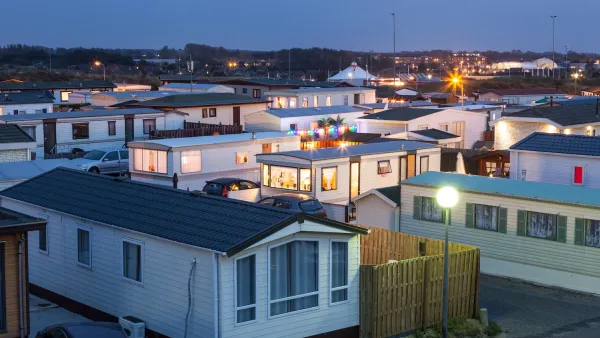A negative perception of manufactured housing persists, though the industry has changed drastically. Winton Pitcoff tells community developers that these homes need to be taken seriously as solutions for the affordable housing crisis.
"The thought of manufactured housing conjures up images of rows of trailer-homes on wheels, and that’s just what they were through the 1960s. The manufactured home industry has changed dramatically since then however."
"HUD regulations implemented in 1976 imposed construction and safety standards on manufactured housing that ultimately moved the industry away from metal-on-metal travel trailers to today’s factory-built frame homes that conform to the same building codes as, and look much like, site-built houses, with asphalt-shingled roofs and vinyl siding and windows. These houses can often be manufactured less expensively than comparable site-built houses, and with greater energy efficiencies."
"Manufactured housing makes up the largest stock of housing affordable to low- and moderate-income homebuyers in the United States. There are more manufactured housing units than the total number of public housing units and Section 8 vouchers combined."
"But while the problems of land-lease communities and chattel loans are real, the affordable housing field’s dismissal of manufactured housing demonstrated a lack of understanding of how far the manufactured housing sector had come toward being able to provide quality affordable housing."
FULL STORY: Maufacturing Solutions

Maui's Vacation Rental Debate Turns Ugly
Verbal attacks, misinformation campaigns and fistfights plague a high-stakes debate to convert thousands of vacation rentals into long-term housing.

Planetizen Federal Action Tracker
A weekly monitor of how Trump’s orders and actions are impacting planners and planning in America.

In Urban Planning, AI Prompting Could be the New Design Thinking
Creativity has long been key to great urban design. What if we see AI as our new creative partner?

Cal Fire Chatbot Fails to Answer Basic Questions
An AI chatbot designed to provide information about wildfires can’t answer questions about evacuation orders, among other problems.

What Happens if Trump Kills Section 8?
The Trump admin aims to slash federal rental aid by nearly half and shift distribution to states. Experts warn this could spike homelessness and destabilize communities nationwide.

Sean Duffy Targets Rainbow Crosswalks in Road Safety Efforts
Despite evidence that colorful crosswalks actually improve intersection safety — and the lack of almost any crosswalks at all on the nation’s most dangerous arterial roads — U.S. Transportation Secretary Duffy is calling on states to remove them.
Urban Design for Planners 1: Software Tools
This six-course series explores essential urban design concepts using open source software and equips planners with the tools they need to participate fully in the urban design process.
Planning for Universal Design
Learn the tools for implementing Universal Design in planning regulations.
Appalachian Highlands Housing Partners
Gallatin County Department of Planning & Community Development
Heyer Gruel & Associates PA
Mpact (founded as Rail~Volution)
City of Camden Redevelopment Agency
City of Astoria
City of Portland
City of Laramie




























